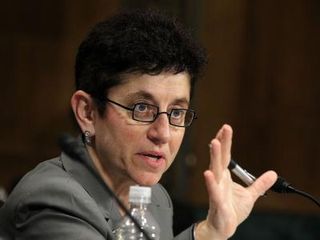Sohn: Title II Shouldn't Adversely Impact Small Ops

Washington, D.C. -- Gigi Sohn, a top aide to FCC Chairman Tom Wheeler, said Wednesday that the FCC’s Title II order was a light-touch approach to new regulations that should not have any adverse impact on smaller cable operators.
That came in a discussion with American Cable Association exec Ross Lieberman at the association’s annual summit in Washington. Lieberman said he would have to agree to disagree with Sohn on that point. Elsewhere at the convention, ACA execs said Title II would likely mean rate regulation and it had not ruled out suing the FCC.
Sohn said the chairman believes that “Light-touch Title II is not going to affect your businesses in any negative way.” She said the FCC is not applying 27 of 43 provisions, and the ones it is applying are on things like privacy protections, protections against billing fraud, and protections for the disabled. She said she hoped they could all agree those were important values, and as cable operators they were subject to privacy protections already. “I don’t want to be so glib as to say these are 'sleeves off the vest,’ because they are requirements,” she said, “but I don’t think you will find them burdensome.”
Lieberman said one thing that could be burdensome is rate regulation. Sohn said that the rules are really pretty much like the 2010 rules (Sohn was at the table when those compromise rules were hammered out), with the exception that paid prioritization is now clearly unacceptable, while under the old rules it was kind of “mushy-gushy.”
She said flatly: “We have decided not to apply every single administrative mechanism that would make rate regulation possible.” Some have argued that that only applies to ex ante regulation, not ex post virtual rate regulation through case-by-case review of business models, or that a future FCC could decide to “unforbear” rate regs, or the a court could reject the FCC’s pick-and-choose forbearance while leaving its Title II reclassification decision alone.
Sohn said that she did not mean to say the rate regulation concerns aren’t valid, but said she did think there was a little bit of scare tactics involved. “There is no desire by this FCC to do rate regulation.” And as to the suggestions about what the next chairman would do? “I would love to see the next chairman go to the Senate and say that they are interested in rate regulation,” she added, meaning that was clearly not going to happen. "I think it is politically infeasible and there is no reason for it and there is no interest [in] it." [as the story was originally written it was not clear Sohn was saying that rate regs would be a nonstarter for the next chairman as it was for this].
Asked about her boss’s agenda now that the Title II vote—if not the debate--is over, Sohn advised (warned) that the chairman planned an even busier agenda. “He actually wants us to do more this year than last year.” Topping the list are work on the broadcast incentive auction, the FCC proposal to define some linear over-the-top video providers, rules for the IP transition, and Lifeline subsidies for broadband.
Multichannel Newsletter
The smarter way to stay on top of the multichannel video marketplace. Sign up below.
While the OVD item has been described in the media mostly as a way to give new over-the-top video entrants equal program access footing with traditional video providers, but Sohn said it was a two-pronged effort.
One, she said, was clearly that program access parity and making the MVPD definition technology neutral (previously the FCC had found that an MVPD had to have the facilities as well as the channels).
But she said it was not only to give new services an opportunity for the programming, but also to make sure that incumbents “don’t start online services to evade the rules.” So, she said there is both a technology and a consumer protection component.
Sohn said she shared ACA’s concern about program bundling and price issues. She pointed out that the FCC last year voted to prevent joint retrans negotiations between noncommonly owned stations among the top four in a market, adding that Congress had later made it even better in the STELAR legislation by extending the prohibition to all noncommonly owned stations. ACA had pushed for that and Lieberman thanked her.
Sohn said that while the chairman does not believe the retransmission consent market is irretrievably broken, but said he does believe it should and can be improved.
She pointed out that the FCC was currently looking at the “40-year-old” network non-duplication and syndicated exclusivity rules, which was step one. Step two? She said that if ACA had “creative ways that we can help you with spiraling programming costs within our jurisdiction,” she wanted to hear from them.
Sohn went out of her way to praise Lieberman and ACA President Matt Polka for their advocacy on Title II. “ACA has put forth some of the best advocacy.” She said that while she did not always agree with them, they were always intelligent, factual and, best of all, civil, which is how she said she tried to be as an advocate—she is co-founder and former head of Public Knowledge. “Pay dues to these guys and they deliver.”
Contributing editor John Eggerton has been an editor and/or writer on media regulation, legislation and policy for over four decades, including covering the FCC, FTC, Congress, the major media trade associations, and the federal courts. In addition to Multichannel News and Broadcasting + Cable, his work has appeared in Radio World, TV Technology, TV Fax, This Week in Consumer Electronics, Variety and the Encyclopedia Britannica.

